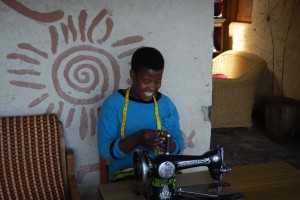 You never know how blinkered you’ve been until those blinkers are removed.
You never know how blinkered you’ve been until those blinkers are removed.
A few days ago I spotted Michael Portillo on TV using the medieval term for Europe: “Christendom”. It was a programme about Christianity and in context, so there was nothing wrong with it.
But it makes the point, very well and very powerfully, how grounded our cultures are in a particular way of approaching life and its concomitant issues, even after centuries of change.
Hence one of the big stumbling blocks to Turkey’s accession to the EU: there are some who still say that the EU is and should remain Christian at heart. Turkey, being a Muslim country, can therefore not join.
A similar set of blinkers surrounds CSR. We in the west tend to think of it as a business strategy .. what if it was more personal than that?
How Is Western CSR Perceived in Africa?
Ida Horner runs Ethnic Supplies, a UK based company which trades fashion accessories and gifts direct from villages in Africa for sale in the UK.
She has a very hands-on approach to her business and regularly visits her suppliers in Rwanda, Uganda, Kenya and Madagascar. Through this contact she has developed an innate understanding of how CSR is tackled in Africa.
I interviewed her for this piece, and started off by asking how CSR and sustainability are tackled by foreign companies in Africa.
“For some companies, their approach is ‘first do no harm,’” she says, “But many are in Africa just to extract raw materials or exploit (the people there)”.
This is often the way we perceive CSR operating outside the US and EU, no doubt often backed up with cheque book philanthropy to create a good image.
What’s So Special About African CSR?
 So I asked whether there was a uniquely African way of addressing the same issues. The answer was all about people:
So I asked whether there was a uniquely African way of addressing the same issues. The answer was all about people:
“People look out for each other … people see it as their responsibility to help. This can both help lift others out of poverty and create independence.”
This closeness engenders a kind of transparency and a genuine caring within the community which western businesses find so hard to emulate.
At its core is the expectation that people will look after one another without reward.
“This (expectation) makes people accountable, no matter how well off they are,” says Ida, explaining that if a person is found to be doing less than is expected they are deeply frowned upon, irrespective of their social or professional position.
This brings to mind the security guards in Seattle, censured for not intervening in a vicious attack happening literally within touching distance.
They were just following company policy which, were told, makes their actions (or lack of them) acceptable. I wonder whether a burden of expectation to look after other people, which Ida speaks of, would have encouraged them to act differently?
Can Western CSR Bring Any Value To Africa?
Lastly, I ask Ida whether western CSR could bring anything of value to Africa. She tells me about her worry that foreign corporations can have a detrimental effect upon the communities they work within.
“If it’s just giving people an excuse to do nothing then no,” she explains, “But if they’re actually doing something worthwhile then yes.”
This is where Ida’s own experience once again comes to the fore. As well as running Ethnic Supplies she’s also involved in Let Them Help Themselves, a small charity which works with communities in Uganda.
 Unlike donation led charities, Let Them Help Themselves engages with communities to help them establish small businesses which can then trade in the local neighbourhood.
Unlike donation led charities, Let Them Help Themselves engages with communities to help them establish small businesses which can then trade in the local neighbourhood.
For example, in the village of Ruhanga, Uganda, the charity has helped to build, equip and staff of a nursery school.
Donations have played a part but the linchpin is the establishment of a co-operative through which the villagers can engage visitors to the nearby mountain gorillas.
It’s About Communities, Not Money
This is a radical departure from normal chequebook philanthropy. Instead of supplying the money to fund the teachers, the charity is helping the villagers to establish self sufficiency through sustainable small businesses.
One of the oldest sayings in the CSR book is the ancient Chinese proverb: “Give a man a fish and you feed him for a day: teach a man to fish and you feed him for a lifetime.”
It should be on the wall of every overseas CSR office of every overseas company, just to make sure the communities they work within come to help themselves, rather than owing their soul to the company store.
All Pictures (c) Ida Horner. Used with permission.
A former CTO, Chris has a broad and varied background. He’s been involved with blue chips, consultancies & SMEs across a wide variety of sectors and has worked in Europe, the Middle East and Australia.
In 2007 he decided to combine his knowledge of business and IT with his passion for all things sustainable and has been busy writing ever since. However, his greatest ambition remains to brew the perfect cup of coffee.



Great website!
This is what some people/companies in Africa believe to be CSR:
Company A wants to gain some media publicity (well, in a handful of cases there is actually a genuine desire to give back).
Company A sends staff to find out the needs of a target community (usually a community where they have either personal or political ties).
Company A purchases needed items and shows up in the paper with a nice picture (plus or minus an article/story) showing donated items to targeted community.
Target community is satisfied and waits for the next company to provide other needed items.
What do you call that?
Hi Katja,
This is counted by many people as CSR; however these efforts may not be sustainable.
Now that companies are starting to think about how to help the communities within which they work they need to ensure that help is sustainable: that they help to build communities which are self reliant, not reliant upon their largesse.
As Ida commented when I was interviewing her, one of the negative effects of CSR in Africa is that it can make some people lazy. This is the next hurdle multinational companies need to overcome.
Best wishes
Chris.